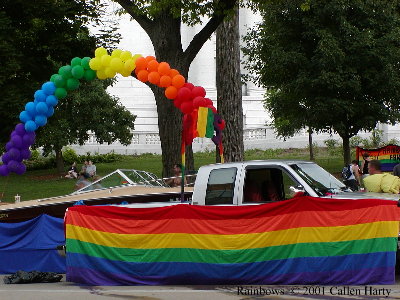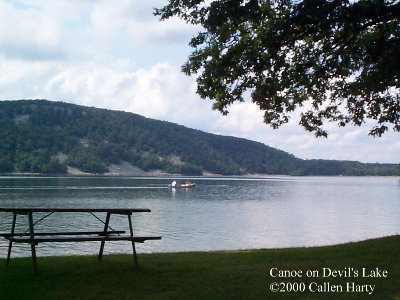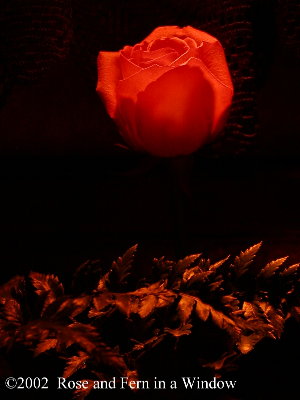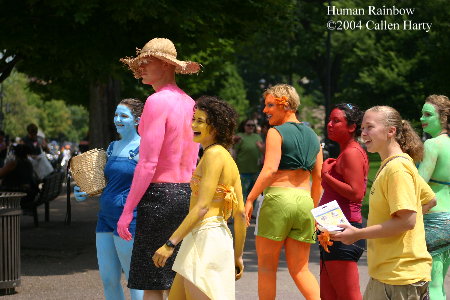

![]()
Member, Gay & Lesbian Alliance (GALA), UW-Platteville, 1981-2
Member, GALA Speakers' Bureau, 1981-2
Published gay writer (poetry, articles & essays)
Co-founder/Charter member, 10% Society, UW-Madison, 1982
Produced gay playwright; LGBT-themed plays include Dream Quest (1993); The Legend of Pinkbeard: Pirate of Men (1996); Gay Like Me (1998); Count Fagula (2001); Radical Harry (2005)
Direct Services Coordinator, OutReach, 1998-2000
Member, Same-Sex Domestic Violence Committee (a committee of the Dane County Coordinated Community Response to Domestic Violence Task Force), 1998-2000
Public Speaker (invited to speak at Frontiers, Dignity, Milwaukee PrideFest, Madison Pride Rally), 1998-2005
Member, OutReach Speakers' Bureau, 2000-03
Co-founder/Artistic Director, Proud Theater, 2000-2004
Adult mentor/member, Proud Theater, 2000-2007
OutReach Man of the Year, 2003
Theater columnist, Our Lives magazine, 2007
![]()

A lone canoe bearing two passengers sliced its way through the water. It was early enough in the season that the park, Devil's Lake, was not overrun by campers. It was inhabited instead by those who felt a need to be there at that time. It was early in a new season of my life also, and that was why I had gone.
We parked the car and immediately started to set up our weekend camp. Brian was an Eagle Scout, so he took command and directed the activities. I had been his guest at the Boy Scout ceremony when he was made an Eagle; he had wanted me to share his pride. All through our lives we had shared our most intimate secrets, our private hopes, our souls.
As he crouched over the fireplace and I sat at a picnic table with pen in hand and a blank notebook before me, I watched him. He was wearing a worn pair of jeans and black sneakers, a red flannel shirt, an old gray sport coat bought at a thrift store in some city I never knew, and a gray hat, with the brim pulled down on the left the way our fathers wore them in the '40s. His style reminded me of gangsters in late-night movies, but his face belied that image.
There were his eyes, innocent, pure; the few freckles on his youthful face; and the few gray hairs painted onto long black ones that at 22 suggested not age, but the wisdom and understanding that had always been his. I studied that face because as well as I knew it--and the person behind it--I was afraid of losing it that weekend. Slowly, and almost of its own will, my pen touched paper and I finally began to write what I had needed to write for years. I began with a simple, powerful phrase: I am gay.
Brian sat on the ground by the fireplace watching the flames, occasionally interjecting a sudden thought. He sensed that whatever I was writing was important for me to finish. And it was very important. On those pages I unleashed the emotions I had hidden for years. On paper, it had a sense of permanence that I could no longer deny.
After we finished eating dinner, he asked, as I knew he would, what was on the paper. Slowly, I reached into my pocket and pulled out the carefully folded sheets and placed them in his hand. I wanted to ask him to understand, to accept me for the person inside as he had always done. But I could not speak. The words I had written would have to speak for themselves.
I waited patiently for him to finish reading, and when he did, I waited nervously for him to speak. He looked at me, confused, and said only, "I have to go for a walk and think about this." I watched his familiar form moving away from me: first my recognizable friend, then a human silhouette, and finally a vague form being swallowed by the night.
How long I waited for Brian's return I do not know. I sat staring into the embers of a dying fire, listening to the sounds of night. I felt alone in the world, with only the stars and the trees and the wind to hear my voice and to dry my tears.
I saw him coming up from the lake. He was walking slowly, but with sure steps. Before I knew it he was standing by the fireplace, leaning down and poking at the logs to rekindle the flame. "I want you to know," he began, "that I don't really understand your feelings, but I want to. And whether I do or not, I still love you and want to be your friend."
After all the years of frustration and self-denial I had finally affirmed myself, and that affirmation had been accepted. We hugged, then sat down and silently watched the fire etch itself into the black night.
![]()
You were always repeating yourself.
In March, in naive spring,
when trees start to shake snow from their limbs,
you met a man you liked,
and took him home.
Morning sunlight hurt you.
Walls and sheets once white as snow
were stained crimson,
and bloody tears dripped from your eyes.
I took a single cut rose to you,
red as blood, with petals
wounded by the wind.

And now in summer I have no flowers.
The petals from that one rose
have dropped to the ground and dried,
like clotted blood.
What man did you meet this time,
who took you to the railroad yard
(Hobo Jungle the paper said);
who left you there, sleeping alone,
to be discovered in the morning,
sun afire on your scarred eyelids?
The train will pass, Earl;
tomorrow morning the train will pass
again the matted grass
where you laid down
with your last lover.
Callen Harty
![]()

Good evening, and thank you. I am honored and humbled by this award. I am especially honored that the award now carries the name of David Runyon, a man whom I loved and respected very much for his dedication to his community. Simply being nominated for this is an honor. To receive the award is an honor for which I do not feel worthy.
While I believe that I have given of myself I also believe that for every single thing that I have done there have been countless unsung heroes who have done even more. I accept this award, then, not for me, but for them.
I accept this award for all of those brave gay and lesbian rural activists who achieve victories in places where it is not as easy to be out and open and proud, people like my friend, Randy, who was always fearless about his demands for equality and justice. There are thousands out in the country who toil in the field of civil rights. This is for them.
It is also for all those volunteers all over the state of Wisconsin who do things like go into classrooms and talk about their lives to enlighten people about what itís like to face life as a queer person in a straight world.
I accept it for people like my friend, Joe, who years ago took the brave step of exploring his gender identity by finding clothes and attitudes and feelings that fit him better than what he had been wearing. His kind of courage lies far beyond most peopleís comprehension of courage.
I also accept this award for all of our allies, for people like my friend, Brian, who has always loved and respected me for who I am, and for what I am. It is also for our allies in the African-American, Asian, Latino, Native-American, and other communities who stand with us in solidarity in the ongoing struggle for equality for all.
I accept this award for the other three co-founders of the 10% Society, my friend Mark, who has worked in myriad other ways to advance the causes of the downtrodden; my friend Larry, whose crazy fairy life has him drifting somewhere around the country still challenging social norms, and my friend, Matthew, who continues to fight against injustice whenever and wherever he finds it.
I accept it for all the artists who struggle to change the world with a word, an image, a song, a touch of paint or a touch of emotion, who reveal the world by exploring it creatively, and who change the world by being true to their art and their hearts and themselves.
In that vein, I accept it for all the teens, adult mentors, parents, and behind-the-scenes supporters of Proud Theater, and also Broom Street and Stage Q, who understand that art can make a difference and that artists who are true to their vision are as much warriors of social revolution as those who wield other kinds of power.
I accept it for those who do have power and use it well, for all those politicians and leaders who stand for civil rights for all, even at the peril of their own careers, people like Governor Dreyfus, whom we honor tonight, and others in this room, people who use what power and influence they have to advance the lives and liberty of all.
But it is not just artists and politicians who advance the cause of social justice in our world. It is also those whose only political act is to bring their lovers to the company picnic. I accept this for all those who bring their lovers to the company picnic, for all those who take the brave step of coming out to friends and family, for all those who quietly do what they have to do to be true to themselves and which, ultimately and without reward, advances civil rights for all.
I accept this award for those who canít, for those who for whatever reason have to remain silent; for those who canít afford to come to a function like this but who struggle to make change; for those who are oppressed and may not even know it.
I accept it for people like my old friend, Richard, people who donít have time to think about activism because all they can do is struggle to define themselves or to feed themselves. I accept it for all the drug and alcohol abusers in our community. I accept it for the silent victims of gay and lesbian domestic violence, who often cannot speak for themselves, and for people like Stacy, Randy, and others who work tirelessly to help them. I accept it for all the victims of discrimination and of violent acts. I have known too many. For every Matthew Shepherd hung on a cross there are countless unknown men and women who carry their own crosses every day. There are countless unidentified victims. There are those who deserve awards for the simple act of survival. I accept this award for them.
And with sorrow I accept it for my dear friend, Dan, who took his own life because he couldnít fight anymore. I accept it for my friend, Earl, whose life was taken from him. I accept it for my friends Larry, Jim, Bruce, and others who lost their struggles with AIDs. I accept it for all those who work to help those peopleóthe drug and alcohol counselors, the social workers, the hospice workers, and on and on. They are legion, these people who give of themselves for the betterment of others. They are the silent and vast and beautiful majority. There are millions upon millions of them in the world, people who silently work to make it a better place and who never get noticed. I accept this award for them.
And finally, I accept this award for my family and friends, who have always been there for me, from my first tentative steps at coming out all the way to today. And especially Brian, my lover and partner these last twelve years, my lover and partner for the rest of my life, my lover and partner on whatever plane and in whatever way our energies continue after this life is over. He never stands behind me in what I doóhe stands beside me in all that I do. With love and deep admiration for all that he is, and all that I am because of him, I accept this for him.
Thank you again for this honor. I accept it with humility for all of those who deserve it, and I will do my utmost to be worthy of holding it for them.
![]()

Before we can celebrate we must remember. I would like to ask all of you for a moment of silence in memory of Matthew Shepherd, Billy Jack Gaither, Jane Vanderbosch, all of our brothers and sisters who have died of AIDS, of violence, or just because it was their time.
Thank you.
I asked for that silence and I am here today because I am gay. I use the word gay because I speak from my own experience, but I mean to include both gays and lesbians. I mean transgender and bisexual. I mean everyone in our community. I mean people of color and ethnicity. I mean the entire family of poor and disenfranchised, the rainbow of oppressed people.
I am here to be out, because I truly believe that when all of us are out, when the grass roots, common, middle-class American people discover that there is not one of them, from Stone Mountain, Georgia, to Madison, Wisconsin, to Helena, Montana, who does not know at least one gay person among their relatives, friends, co-workers, and neighbors--when that has occurred--then there will be less need for debate and no more need for rallies like this.
But I have come here today because things still need to change. I have come here today because I am tired and I am angry, simply because I am gay.
I have known people who were beaten with fists and boots and brass knuckles, to the point of hospitalization, simply because they were gay.
I have seen friends lose jobs, simply because they were discovered to be gay, though other reasons were given for the dismissal.
I have been verbally harassed, physically threatened, and had my life threatened, simply because of my gayness.
I have known people deeply in love who were denied the chance to express that love in the form of marriage, simply because they were gay.
I have had friends who were disowned by their families, simply because they were gay.
I had a friend who took someone home with him for the night and who was stabbed 17 times, who survived that and was found in another city four months later clubbed to death, simply because he was gay, and Native American.
I have had my best friend commit suicide simply because he was gay.
These things have all happened here, in Madison, and in Wisconsin, the gay rights state.
I am tired, and I am angry, simply because I am gay.
It is time for a change. The chains of oppression have been wound so tightly around us that our hearts are bleeding. But it cannot go on forever. One day, when all of us are tired enough, or angry enough, we will break those chains and link our arms in a defiant march of love. And the power of our love will overpower. Our love, a trickle at first, will become a stream, the stream a river, the river a sea, the sea an ocean, and that much love cannot fail to engulf the hatred we face and destroy it. Then we will be free. Then we will be joyously alive, simply because we are gay.
![]()
![]()
Return to Callen's Home Page
Send e-mail